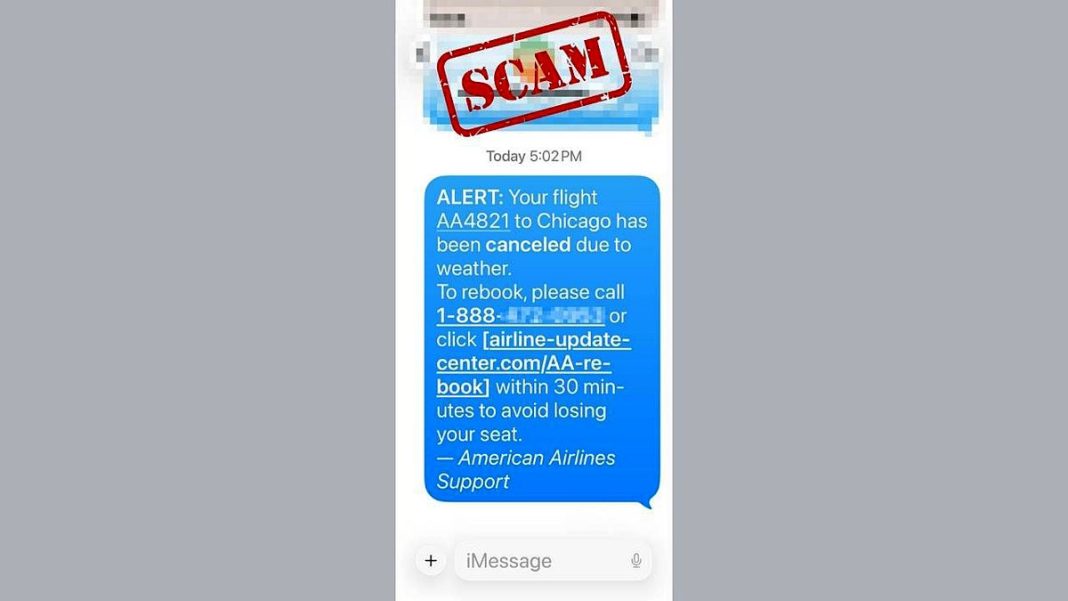Fake Flight Cancellation Texts Target Anxious Travelers
A sophisticated new travel scam is using fake flight cancellation texts to trick passengers into revealing credit card details and personal information. These AI-generated messages appear so authentic that even frequent travelers are being deceived.
Key Takeaways
- Scammers send fake cancellation texts with real airline details
- AI technology makes these messages increasingly convincing
- Always verify flight changes through official airline sources
- Never click links or call numbers from unexpected texts
How the Flight Cancellation Scam Works
The scam begins with a text message that appears to be from your airline, often including your name, flight number, and a link or phone number. The message uses urgent language stating your flight is canceled or delayed and instructs you to “call this number” or “click to rebook.”
Once you respond, you’re connected to a scammer posing as an airline agent who offers to rebook your flight for a fee. They typically request payment details or personal information such as your birth date or passport number.
In some cases, scammers send fake confirmation emails that appear official to make the deception more believable.
AI-generated messages make these scams harder to spot, mimicking airline alerts so well that even frequent flyers can be fooled during busy travel seasons. (Kurt “CyberGuy” Knutsson)
Why These Scams Feel So Real
Scammers use legitimate airline names, logos, and flight numbers to create convincing messages. Many now employ AI tools to generate authentic-sounding language and fake confirmations that closely mimic real airline communications.
These messages often arrive during busy travel seasons or weather-related delays, making them feel particularly timely and believable.
The Federal Trade Commission warns that criminals are impersonating airline customer service through fake texts and calls claiming flights are canceled. They exploit passenger panic to pressure immediate action.
The Better Business Bureau reports a significant increase in fake cancellation notices containing fraudulent phone numbers that connect directly to scammers.
Staying calm and verifying through official airline apps or websites is the safest way to protect your money and personal information before you take action. (Kurt “CyberGuy” Knutsson)
6 Essential Safety Steps
1. Verify Through Official Sources
Always confirm flight updates using the airline’s official website or mobile app. Log in directly rather than clicking links from unexpected texts or emails.
2. Use Verified Contact Numbers
If you need customer service, use the number from your booking confirmation, the airline’s app, or their verified website. Never trust numbers sent via text or social media.
3. Recognize Urgency Traps
Scammers rely on panic. Messages containing phrases like “call now,” “act fast,” or “your seat will be canceled” are designed to rush you. Always verify before responding.
4. Protect Financial Information
Legitimate airline staff will never request gift card numbers, wire transfers, or bank login details. Use strong antivirus protection to block phishing sites.
5. Limit Personal Data Exposure
Consider using data-removal services to reduce your personal information available on people-search websites, making it harder for scammers to target you specifically.
6. Report Suspicious Messages
Forward scam texts to 7726 (SPAM) and report fake airline messages to the Federal Trade Commission at reportfraud.ftc.gov. Reporting helps authorities shut down active scams.
Final Recommendations
Fake flight cancellation scams are spreading rapidly, particularly during peak travel periods. Maintain calm, verify all changes through official airline channels, and avoid clicking random links or calling unknown numbers. While technology enhances travel convenience, awareness and caution remain your strongest defenses.






